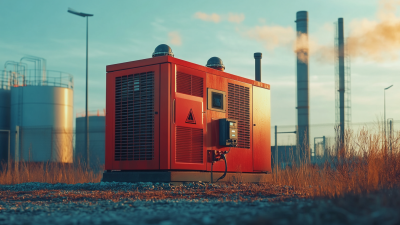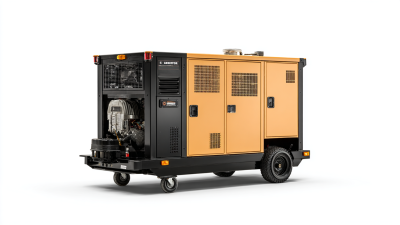
-
Home
-
Products
-
Service
-
About Us
-
Solution
-
Videos
-
News
-
Contact Us
Leave Your Message

In the quest for sustainable energy solutions, Diesel Generators have emerged as a pivotal technology, providing reliable and efficient power in various applications. According to a report by the International Energy Agency (IEA), the global diesel generator market is projected to reach USD 23 billion by 2026, fueled by the increasing demand for uninterrupted power supply across sectors such as healthcare, telecommunications, and manufacturing. This trend underscores the growing need for dependable energy sources, especially in regions where grid access remains inconsistent.
Experts in the field, like Dr. Emma Rodriguez, a noted authority on energy systems, emphasize the importance of Diesel Generators in bridging the energy gap. She stated, “Diesel Generators not only support energy sustainability but also offer a versatile solution for emerging markets where infrastructure development is still catching up.” This adaptability, combined with advancements in fuel efficiency and emission controls, solidifies the role of Diesel Generators as a key component in developing sustainable energy frameworks.
Moreover, their ability to integrate with renewable energy sources enhances their appeal, providing backup options and smoothing out energy supply fluctuations. As industries increasingly prioritize sustainability, the focus on Diesel Generators is set to grow, paving the way for innovative approaches that align with global energy goals.

Diesel generators play a crucial role in supporting renewable energy applications, providing a reliable power source when the sun isn't shining or the wind isn't blowing. According to a report from the International Energy Agency (IEA), the integration of diesel generators with renewable sources can enhance grid stability and energy security, especially in remote and off-grid locations where traditional connectivity is lacking. By acting as backup power solutions, diesel generators ensure that critical infrastructure, such as hospitals and data centers, can continue to operate during energy shortages.
Moreover, the economic benefits of diesel generators cannot be overlooked. A study by the U.S. Department of Energy indicates that using diesel generators in conjunction with renewable energy systems can reduce operational costs by up to 30%. This combination provides a more efficient energy mix, balancing the variability of renewable sources while decreasing dependency on fossil fuels and cutting emissions in the long run. The ability to utilize diesel generators as part of a hybrid system enhances their appeal in a transitioning energy market focused on sustainability and resilience.
Modern diesel generators have evolved significantly, offering a sustainable energy solution that balances efficiency with environmental consciousness. One of the most important aspects to consider is their reduced environmental impact compared to older models. Advances in technology have led to the development of cleaner-burning diesel engines, which emit fewer pollutants and particulate matter. Furthermore, many newer generators are equipped with after-treatment systems that significantly cut down on nitrogen oxides and sulfur dioxide emissions, making them compliant with stringent environmental regulations.
In addition, diesel generators provide a reliable source of power in regions where grid access is limited or unreliable. Their ability to operate in remote locations not only supports economic development but also helps to facilitate the use of renewable energy sources, such as solar and wind, by providing backup power when these sources are unavailable.
Overall, modern diesel generators are becoming a vital component of sustainable energy strategies, effectively minimizing their ecological footprint while ensuring energy reliability in various applications.
The analysis of diesel generators in comparison to alternative energy sources reveals significant
cost-effectiveness, making them an attractive option for sustainable energy solutions. Diesel generators are known for their
reliability and efficiency, providing a steady power supply. With the global generator sales market projected to grow from
$33.56 billion in 2025 to $49.56 billion by 2032, it's clear that diesel technology continues to play a vital role in energy production.
Moreover, the global natural gas engine market is also on an upward trajectory, expected to reach $5.01 billion by 2024 and grow to
$8.08 billion by 2032. This indicates a strong demand for various fuel sources in energy generation. Diesel generators provide the unique advantage of lower initial investment costs and reduced operating expenses compared to some alternative energy technologies, positioning them favorably within the energy market. Their versatility in various applications, coupled with advancements in efficiency, ensures that they remain a practical choice in the ongoing pursuit of sustainable energy solutions.
Integrating diesel generators into sustainable energy systems presents a promising opportunity to enhance the resilience and reliability of power supply, particularly in remote areas where conventional energy sources may fall short. Recent studies emphasize the effectiveness of hybrid power solutions, combining diesel generators with renewable resources such as solar panels and energy storage systems. This approach not only optimizes fuel efficiency but also addresses economic considerations by leveraging the strengths of each energy source in a complementary manner.
As nations like Nigeria move towards phasing out traditional diesel generators in favor of hybrid energy systems, the focus on minimizing environmental impact becomes paramount. For remote communities heavily reliant on diesel, transitioning to hybrid systems incorporating renewable technologies can mitigate the detrimental effects of diesel dependency while fostering local job creation in the green energy sector. Furthermore, the integration of artificial intelligence in planning these hybrid systems can significantly enhance their operational efficiency, ensuring that the transition is both sustainable and economically viable.
| Advantage | Description | Environmental Impact | Fuel Efficiency |
|---|---|---|---|
| Reliability | Diesel generators provide a consistent and reliable power source, especially in remote areas. | Lower emissions than conventional methods when properly maintained. | High thermal efficiency translates to better fuel utilization. |
| Scalability | Easy to scale power generation by adding more units as demands increase. | Potential for integration with renewable sources to reduce overall carbon footprint. | Modular design allows for efficient power management. |
| Cost-Effectiveness | Lower initial investment compared to other backup power solutions. | Continuous advancements in technology are making diesel cleaner. | Long life and lower maintenance costs enhance financial efficiency. |
| Fuel Availability | Diesel fuel is widely available across various locations. | Availability of cleaner diesel options contribute to reduction in pollutants. | Advanced technologies improve the efficiency of diesel use. |
Proper maintenance of diesel generators is crucial for maximizing their lifespan and efficiency. Regular inspections should include checking fluid levels, air filters, and battery connections to ensure optimal operation. It is essential to adhere to a periodic maintenance schedule that encompasses oil changes, coolant checks, and thorough cleaning of components. This proactive approach not only prevents unexpected breakdowns but also enhances fuel efficiency, contributing to a more sustainable energy solution.
Additionally, user education plays a vital role in maintenance best practices. Operators should be trained to recognize early warning signs, such as unusual noises or fluctuations in performance. Timely responses to these indicators can prevent costly repairs and extend the generator's operational life. Furthermore, ensuring that all parts are sourced from reputable suppliers can safeguard against inferior components that could compromise the generator's performance and reliability. By prioritizing these maintenance practices, users can ensure that diesel generators remain an effective component of sustainable energy solutions.





